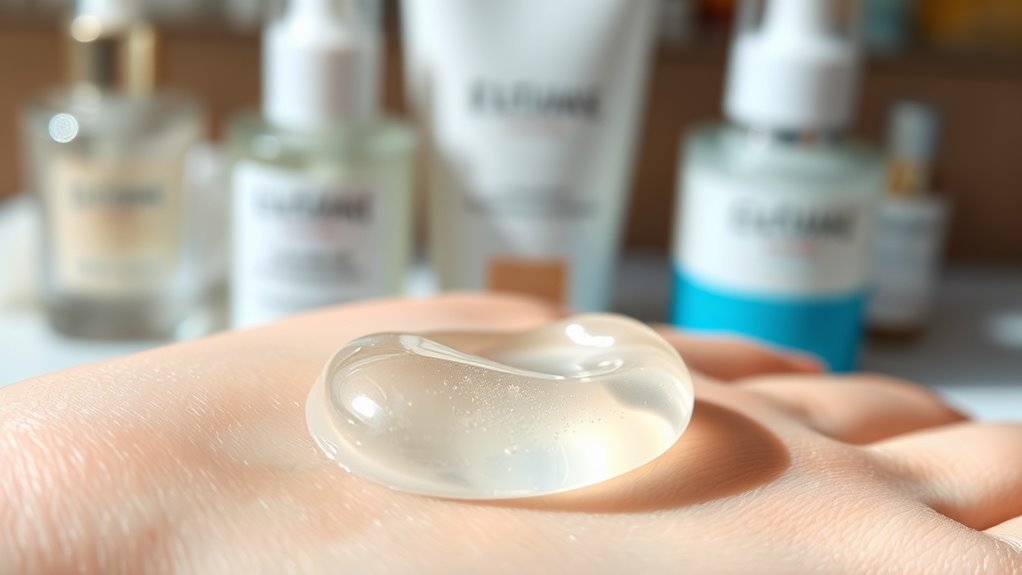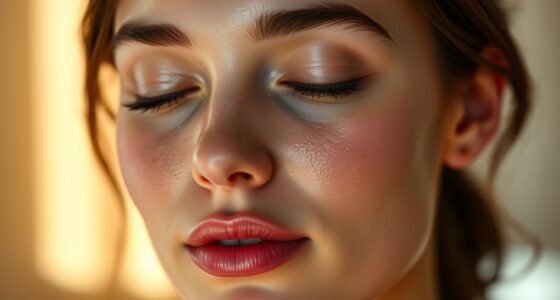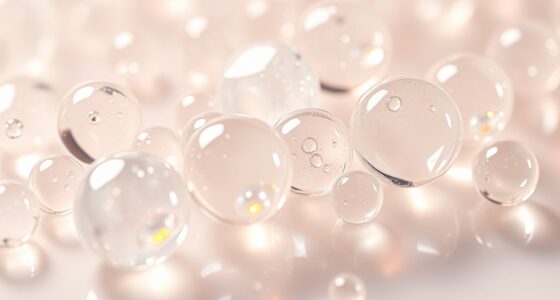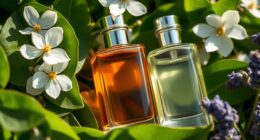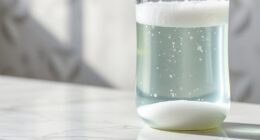Certain ingredients in moisturizers, like propylene glycol and alcohol-based components, can strip your skin of its natural moisture, causing dehydration instead of hydration. Propylene glycol weakens your skin’s barrier, leading to increased dryness and sensitivity. Alcohols evaporate quickly, removing essential oils and moisture from your skin. If you avoid these harmful ingredients and choose formulations that support your skin’s barrier, you’ll see better hydration—explore further to learn how to spot and skip these dehydrating components.
Key Takeaways
- Alcohol-based ingredients like SD alcohol and denatured alcohol quickly evaporate, stripping natural oils and causing dehydration.
- Propylene glycol can weaken the skin barrier by removing lipids, leading to increased water loss and dryness.
- Excessive use of humectants without sealing with occlusives can pull moisture from the skin, resulting in dehydration.
- Fragrances and artificial dyes may irritate sensitive skin, impairing barrier function and increasing moisture loss.
- Products with harmful alcohols or irritants can disrupt hydration balance, making skin feel drier despite moisturizing claims.
Understanding Humectants and Their Role in Skincare

Humectants are ingredients in skincare that attract water from the environment and deeper layers of your skin to keep your surface hydrated. They pull moisture from the air and your skin’s inner layers, boosting hydration on the surface. Common humectants include glycerin, hyaluronic acid, and urea. When applied, they form a barrier that holds water, making your skin feel plump and smooth. However, their effectiveness depends on humidity levels; in dry environments, humectants can draw water from your skin instead of the air, potentially leading to dehydration. This phenomenon is especially common in low-humidity conditions, where moisture is scarce. The skin’s barrier function can be compromised in such environments, making hydration more difficult. In these cases, environmental factors play a crucial role in hydration levels. This means that using humectants alone might not always provide lasting hydration. To maximize their benefits, pairing them with occlusive ingredients that seal in moisture is essential. Proper use ensures your skin stays hydrated and healthy. Relative humidity plays a key role in how vibrant and detailed your skin appears, especially in low-light conditions.
The Hidden Dangers of Propylene Glycol

Propylene glycol, a common ingredient in many moisturizers, can weaken your skin’s barrier over time. This may lead to increased sensitivity and a higher chance of allergic reactions. Being aware of these hidden risks helps you make smarter choices for healthier skin. Additionally, certain ingredients like propylene glycol are subject to ongoing regulatory scrutiny, emphasizing the importance of staying informed about product safety. As the demand for safer skincare increases, consumer awareness about ingredient safety becomes more critical than ever. Monitoring ingredient labels can help you avoid potentially irritating substances. Practicing mindful ingredient selection can further enhance your skincare routine and overall skin health, especially since understanding cosmetic regulations can guide better product choices.
Skin Barrier Disruption
Although commonly found in skincare products, propylene glycol can compromise your skin’s natural barrier by stripping away essential lipids and disrupting its protective functions. When this barrier weakens, your skin becomes more vulnerable to environmental aggressors like pollution, bacteria, and harsh weather. This disruption can lead to increased transepidermal water loss, making your skin feel dry and appear dull. You might notice sensations of tightness, redness, or irritation after using products containing propylene glycol. Over time, repeated barrier damage can cause persistent sensitivity and even contribute to premature aging. By weakening your skin’s defenses, propylene glycol not only hampers hydration but also sets the stage for ongoing skin issues. Skin barrier disruption can also be exacerbated by certain ingredients that strip natural oils, further weakening your skin’s resilience. Protecting your barrier is essential for maintaining healthy, resilient skin. Recognizing and avoiding such damaging ingredients empowers you to support your skin’s natural protective functions.
Allergic Reactions Risk
While propylene glycol can weaken your skin’s barrier and increase sensitivity, it also poses a hidden danger: the risk of allergic reactions. If you have sensitive skin or a history of allergies, exposure to this ingredient could trigger redness, itching, or swelling. In some cases, you might develop contact dermatitis, which causes painful rashes and irritation. Even if you haven’t reacted before, repeated exposure can sensitize your skin over time. This means you might suddenly experience a reaction after using certain moisturizers. Always check labels carefully and patch-test new products containing propylene glycol. Recognizing early signs of an allergic response is vital to prevent more severe reactions and protect your skin’s health. Additionally, understanding allergic reactions can help you identify and avoid potential irritants in skincare products. Being aware of skin sensitivities and their triggers can further help you manage and prevent adverse responses. Knowing how to identify allergenic ingredients can empower you to make safer skincare choices. Moreover, understanding the role of AI-powered product safety analysis can assist brands in formulating gentler, hypoallergenic options.
How Glycerin Can Sometimes Dehydrate Your Skin
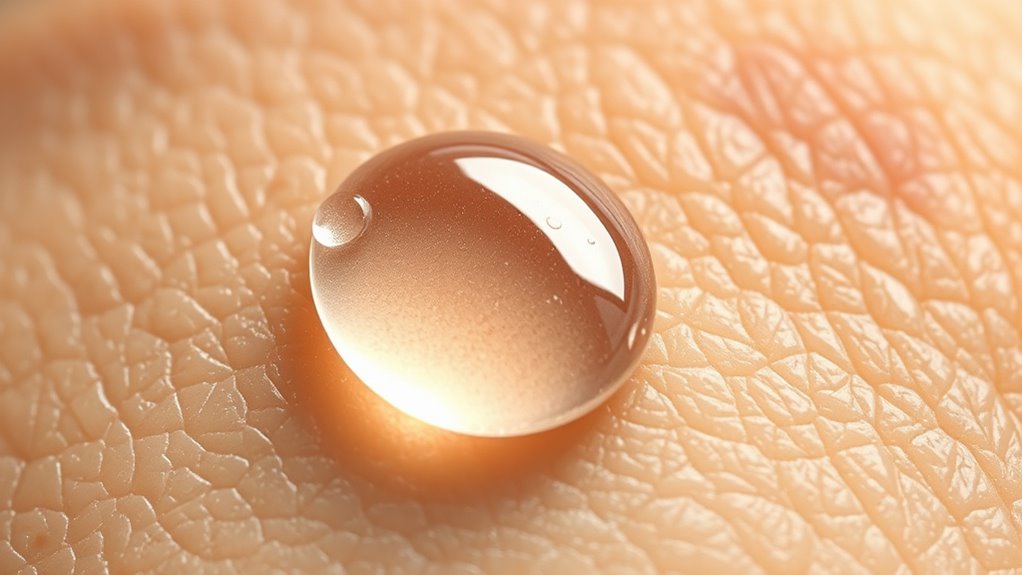
Glycerin is known for attracting moisture, but if the environment is too dry, it can actually pull water away from your skin instead of adding to it. When it absorbs moisture too quickly, it may leave your skin feeling drier over time. Understanding how glycerin interacts with your skin helps you avoid potential dehydration. Proper application timing and environment control can help maximize its benefits while preventing dehydration. Additionally, using glycerin in combination with humectants can help maintain optimal hydration levels. Being mindful of your skin type and local climate conditions can further improve the effectiveness of glycerin-based moisturizers. Recognizing the environmental conditions is essential for determining when glycerin will hydrate rather than dehydrate your skin. Being aware of humidity levels can also guide you in choosing the right skincare routine for your environment.
Absorbs Moisture Too Quickly
Glycerin is known for attracting moisture to the skin, but sometimes it can do more harm than it does by drawing water out instead. When it absorbs moisture too quickly, it can leave your skin feeling dry and tight. Here’s what you need to know:
- Rapid moisture intake can strip away natural oils, disrupting your skin’s barrier. Skin barrier integrity is crucial for maintaining hydration and protecting against environmental stressors.
- It may cause your skin to lose hydration faster than it gains it.
- Over-absorption can lead to irritation or redness.
- In dry environments, glycerin’s quick action can worsen dehydration rather than improve it.
- Ensuring proper ventilation and regulation of skincare ingredients can help prevent these issues.
- Additionally, the environmental conditions can influence whether glycerin hydrates or dehydrates your skin, making it important to consider climate factors when choosing skincare products.
- The spiritual energy of your surroundings can also impact how your skin responds to certain ingredients, as energetic imbalances may influence skin health and hydration levels.
- Being aware of skin type and individual sensitivities can help tailor your skincare routine to prevent dehydration caused by glycerin.
Can Draw Water Out
Although glycerin is often praised for attracting moisture, under certain conditions, it can actually pull water out of your skin instead. This happens when the air around you is very dry or the humidity drops markedly. Glycerin works by drawing water from its surroundings into your skin, but if there’s little moisture in the air, it pulls water from the deeper layers of your skin instead. To avoid this, make sure to use glycerin-based products in humid environments or layer them with occlusive ingredients that lock in moisture. Otherwise, instead of hydrating, glycerin might leave your skin feeling even more parched. Additionally, understanding the environmental conditions can help you determine when glycerin is likely to be beneficial or detrimental.
The Impact of Alcohol-Based Ingredients in Moisturizers
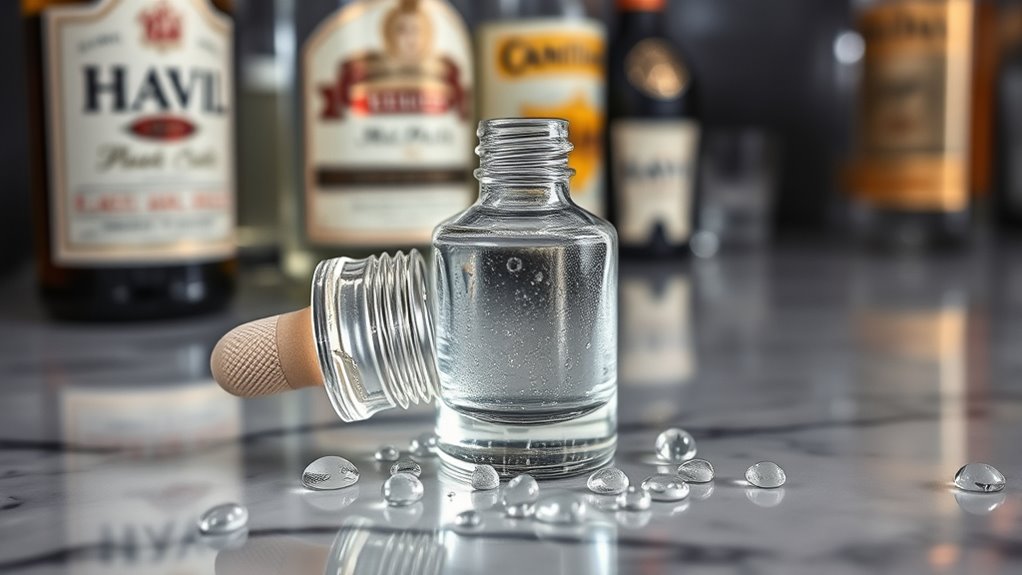
Alcohol-based ingredients in moisturizers can markedly impact your skin’s hydration levels. These ingredients often evaporate quickly, stripping away your skin’s natural oils and moisture. Here’s what you should watch for:
- Dryness and tightness: Alcohols can cause your skin to feel rough and uncomfortable.
- Barrier damage: They weaken your skin’s protective barrier, making it more vulnerable to environmental stressors.
- Increased irritation: Alcohols may cause redness, itching, or burning, especially if your skin is sensitive.
- Accelerated aging: Over time, alcohol can contribute to fine lines and sagging by dehydrating your skin’s deeper layers.
Choosing alcohol-free moisturizers helps maintain hydration and supports healthier, more resilient skin.
Why Overusing Humectants Can Backfire

Using too many humectants can actually pull moisture out of your skin instead of adding to it. This can weaken your skin’s natural barrier, making it more vulnerable to dehydration. If you overdo it, your skin might end up feeling drier and more irritated.
Excessive Moisture Draws
While humectants like glycerin and hyaluronic acid attract moisture to your skin, overusing them can actually cause dehydration. When you apply too much, they draw water from deeper layers or even the environment, leaving your skin dry. To avoid this, watch out for these common pitfalls:
- Applying excessive amounts without sealing them with occlusives
- Using humectants in very dry or low-humidity environments
- Relying solely on humectants without supporting ingredients
- Over-layering products containing humectants repeatedly throughout the day
This over-application can create a continuous cycle of moisture loss, leaving your skin feeling tight and flaky instead of hydrated. To maintain balance, always pair humectants with occlusive ingredients and adjust based on your environment and skin needs.
Barrier Disruption Risks
Overapplying humectants can compromise your skin’s natural barrier, making it more vulnerable to damage and irritation. When you use too much, especially on already compromised skin, it can cause excessive water loss through evaporation. This leaves your skin dehydrated and weakens its defense against environmental stressors. A disrupted barrier can lead to redness, sensitivity, and even breakouts. Overusing humectants may also encourage bacteria and pollutants to penetrate more easily, increasing the risk of infection and inflammation. To protect your skin, it’s essential not to rely solely on humectants. Instead, balance them with emollients and occlusives that seal in moisture and support barrier repair, ensuring your skin stays resilient and healthy.
Recognizing the Signs of Dehydrated Skin Caused by Ingredients
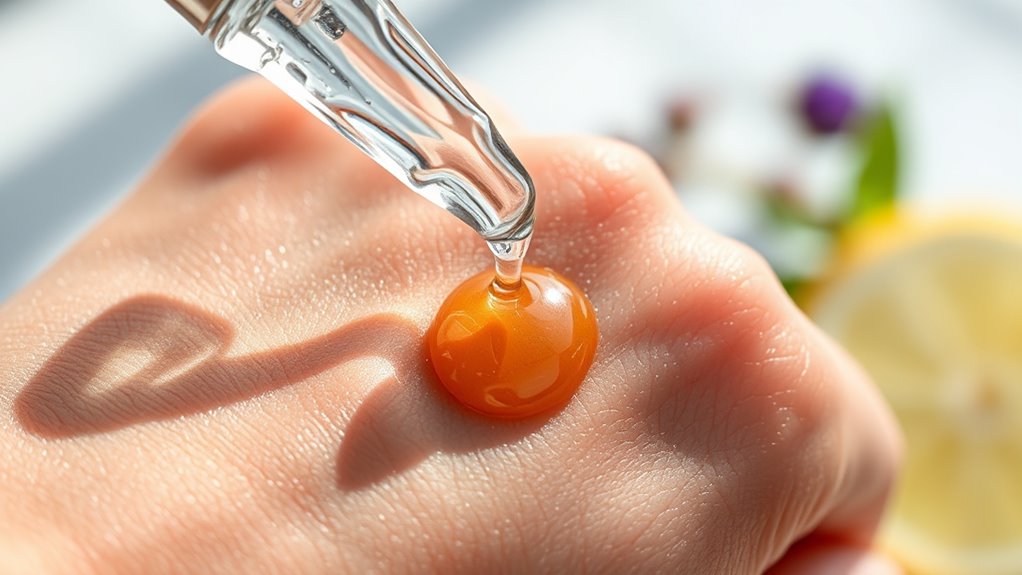
Dehydrated skin caused by ingredients often shows clear and noticeable signs that you can learn to recognize. If you notice these symptoms, a dehydrating ingredient might be the culprit.
- You feel tightness or a stretched sensation after applying products.
- Your skin appears dull, lacking radiance or glow.
- Fine lines seem more pronounced, especially around your eyes and mouth.
- You experience increased sensitivity or redness, even without irritation.
These signs indicate your skin isn’t holding onto moisture properly, often due to harmful ingredients. Paying attention to how your skin reacts after using certain products can help you identify problematic ingredients and prevent further dehydration. Recognizing these signs early allows you to adjust your routine for healthier, better-hydrated skin.
Choosing Hydrating Products Without Harmful Additives

Choosing hydrating products that support your skin’s health involves more than just looking for labels promising moisture; it requires scrutinizing ingredients to avoid harmful additives. Many products contain alcohols, parabens, synthetic fragrances, and preservatives that can strip moisture or irritate your skin. Check ingredient lists carefully, and opt for products with natural, nourishing ingredients like hyaluronic acid, glycerin, or aloe vera. Avoid products with unpronounceable chemical names or known irritants. Remember, a product labeled “hypoallergenic” isn’t always free from harmful additives. Your goal is to choose formulations that hydrate without risking further dehydration or irritation. Reading reviews and doing patch tests can help you identify truly gentle, effective options. Prioritize transparency and simplicity to ensure your skincare supports, rather than harms, your skin’s moisture balance.
Alternatives to Common Dehydrating Ingredients
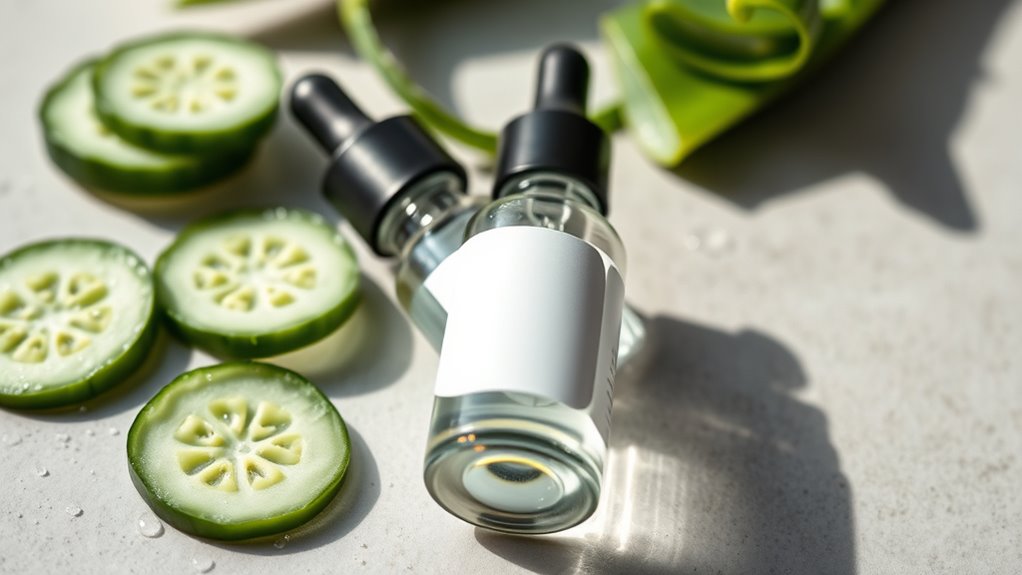
Many common dehydrating ingredients, such as alcohol-based toners and synthetic fragrances, can strip moisture from your skin and cause irritation. To avoid this, look for better alternatives. Consider these options:
Avoid dehydrating ingredients like alcohol and synthetic fragrances; opt for hydrating, soothing, and natural skincare alternatives.
- Hydrating humectants like glycerin or hyaluronic acid, which attract moisture into your skin.
- Aloe vera with its soothing, hydrating properties, perfect for calming and moisturizing.
- Natural oils such as jojoba or squalane, which lock in hydration without clogging pores.
- Alcohol-free toners made from witch hazel or rose water, providing refreshment without stripping natural oils.
Switching to these alternatives helps maintain your skin’s hydration and reduces irritation. They support a healthier moisture balance without the harmful effects of traditional dehydrating ingredients.
Tips for Supporting Your Skin’s Natural Moisture Barrier

To effectively support your skin’s natural moisture barrier, focus on gentle, nourishing practices that strengthen its resilience. Keep your skincare routine simple and avoid harsh cleansers that strip away essential oils. Use lukewarm water instead of hot, as hot water can weaken your barrier. Incorporate products with ceramides, fatty acids, and humectants like hyaluronic acid to help replenish lipids and attract moisture. Protect your skin from environmental stressors by wearing sunscreen daily, even when it’s cloudy. Stay consistent with your routine, and avoid over-exfoliating, which can damage your barrier. Prioritize sleep, stay hydrated, and maintain a balanced diet rich in antioxidants. These habits help your skin naturally repair and maintain its moisture barrier, promoting healthier, more resilient skin over time.
Reading Labels: What to Avoid and What to Seek in Moisturizers
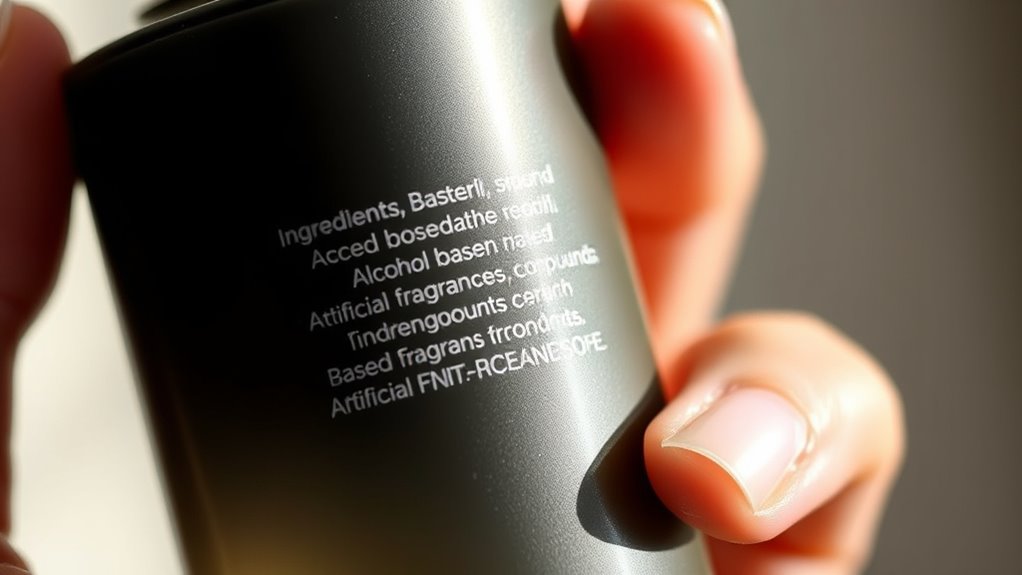
Reading labels on moisturizers empowers you to select products that support your skin’s health and avoid ingredients that can cause dehydration or irritation. To do this effectively, look for key ingredients to seek or avoid.
Reading labels helps you choose moisturizers that nourish your skin and prevent irritation.
- Seek humectants like glycerin or hyaluronic acid, which attract moisture into your skin.
- Avoid alcohol-based ingredients such as SD alcohol or denatured alcohol, which can dry out your skin.
- Check for occlusives like petrolatum or shea butter that lock in moisture.
- Beware of fragrances and artificial dyes, which can irritate sensitive skin.
Frequently Asked Questions
Can Mineral Oils Also Cause Skin Dehydration?
Yes, mineral oils can cause skin dehydration if they create a heavy, occlusive barrier that traps moisture and prevents your skin from breathing. While they lock in hydration, they might also block essential water loss, leading to dryness over time. If your skin feels tight or flaky after using mineral oils, it’s a sign they’re not providing the hydration you need. Always pay attention to how your skin responds.
How Do Preservatives Affect Moisturizer Hydration Levels?
Preservatives can impact your moisturizer’s hydration if they irritate your skin or disrupt its natural barrier. Some preservatives might cause inflammation, leading to increased moisture loss. Look out for formulas with gentle, skin-friendly preservatives like phenoxyethanol or natural options like vitamin E. When preservatives are harsh, they can compromise your skin’s ability to retain moisture, making your moisturizer less effective and potentially dehydrating your skin over time.
Are Natural or Organic Ingredients Less Likely to Dehydrate Skin?
When it comes to natural or organic ingredients, you might think they’re always better for your skin, but that’s not necessarily true. Some natural ingredients can be irritating or drying if they strip away moisture or disrupt your skin’s balance. You should pay attention to how your skin reacts and choose products with balanced, hydrating ingredients. Always patch-test new products and look for those that support your skin’s natural barrier.
What Role Does Ph Balance Play in Moisturizer Effectiveness?
You might wonder how pH balance impacts your moisturizer’s effectiveness. When your skin’s pH stays around 4.5 to 5.5, it maintains a healthy barrier, trapping moisture and resisting irritants. If your moisturizer’s pH is too high or low, it can disrupt this balance, making your skin more prone to dehydration and irritation. Choose products that match your skin’s natural pH to guarantee ideal hydration and protection.
Can Environmental Factors Influence Ingredient-Induced Dehydration?
Environmental factors can totally wreck your skin! Harsh winds, scorching sun, and freezing cold don’t just bother you—they can make your moisturizer’s ingredients backfire. Instead of hydrating, they strip moisture away, causing dehydration. You might think your moisturizer’s doing its job, but these elements sabotage it. To keep your skin happy, protect it with barriers like SPF, humidifiers, and gentle cleansers, especially when nature’s out to get you.
Conclusion
By understanding the ingredients that can secretly dry out your skin, you hold the power to make smarter choices. Think of your moisturizer as a delicate dance—balance is key. Avoid harmful additives like certain alcohols and propylene glycol, and opt for gentle, nourishing options. When you read labels carefully, you’re not just buying a product; you’re investing in a healthier, more resilient skin canvas. Your skin’s glow depends on your knowledge—use it wisely.
